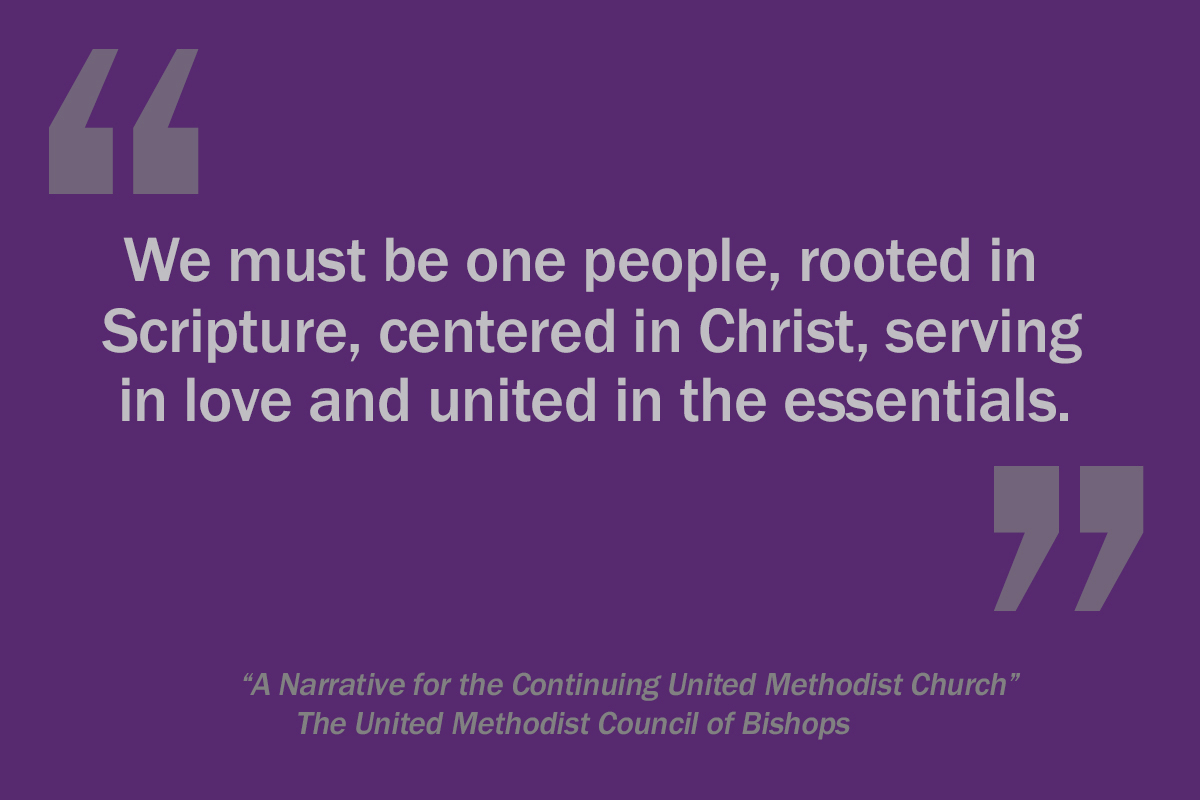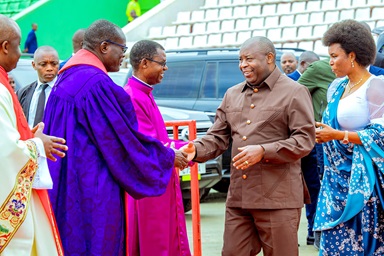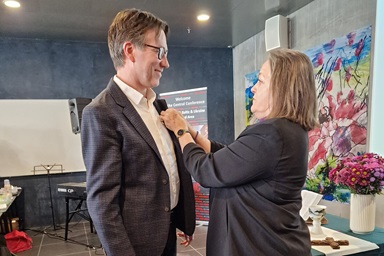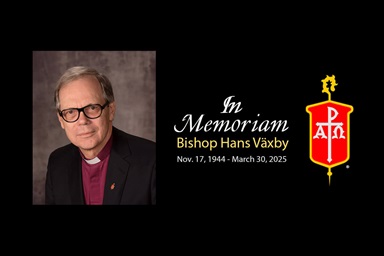Key points:
- As the denomination edges toward some form of separation, bishops issue a narrative to describe their hopes for the continuing United Methodist Church.
- They envision a church driven by the mission of Christ, where all will have a home.
- The bishops aim for the narrative to be a starting point for United Methodists’ visioning work ahead.
The Council of Bishops has cast a vision for a future United Methodist Church that transcends the labels many church members use to describe themselves.
“We cannot be a traditional church or a progressive church or a centrist church. We cannot be a gay or straight church,” asserts what the bishops have titled “A Narrative for the Continuing United Methodist Church.”
The bishops’ narrative, instead, envisions a denomination rooted in Scripture, centered in Christ and welcoming to all churchgoers — however they identify.
“Our best witness is to love each other as Christ loves us, to show the world the supernatural power of the Holy Spirit to bind us together despite our differences,” the narrative proclaims. “This is living out the gospel.”
To learn more
The bishops affirmed the two-page narrative while in closed session during their fall online meeting Nov. 2-5.
While the bishops do not publicize tallies for votes taken in closed session, Council of Bishops President Cynthia Fierro Harvey said the document received overwhelming approval.
Only active bishops can vote at council meetings. Still, it’s no mean feat for any theological statement to garner their wide affirmation. The bishops comprise a multiethnic international executive body that, in many ways, is as diverse as the denomination they help lead.
“I pray that this narrative begins to paint a picture and sets a vision for the continuing UMC,” Harvey, who also leads the Louisiana Conference, told United Methodist News.
New York Conference Bishop Thomas J. Bickerton, who is the incoming Council of Bishops president, said he hopes the document “can be used to assist anyone anywhere who is working toward a more just, inclusive and welcoming church.”
The bishops’ narrative arrives at a time when the denomination’s story seems about to take a turn.
After decades of intensifying disputes over the status of LGBTQ people, the denomination is edging toward some kind of separation along theological lines.
The COVID-19 pandemic has twice delayed General Conference, the denomination’s top legislative body that would make any final decisions on a separation plan. The international assembly is now scheduled for Aug. 29-Sept. 6, 2022, in Minneapolis.
In the meantime, the Wesleyan Covenant Association — a traditionalist advocacy organization — is working toward the formation of a new denomination, the Global Methodist Church. Another group is developing a new denomination informed by liberation theology, the Liberation Methodist Connexion.
However, a broad swath of churchgoers plan to remain United Methodist, and many already have started preparations for how they envision the future church will minister. United Methodists also have continued to serve beyond their church walls — providing disaster relief, caring for refugees, expanding vaccine access, addressing climate change and tackling the long-term effects of racism.
Many of these United Methodists — including multiple bishops — have been upfront about their hope that the continuing denomination will welcome LGBTQ people into all aspects of church life and overcome the barriers that divide God’s human creation.
The bishops’ narrative describes the continuing United Methodist Church as:
- Confident in what God has done in Christ Jesus for all humankind.
- Committed to personal and social salvation/transformation.
- Courageous in dismantling the powers of racism, tribalism and colonialism.
Bishop Kenneth H. Carter, immediate past president of the Council of Bishops, served as convener of the narrative writing team. He said bishops have an obligation to bring comfort, strength and hope in this complicated moment of history.
“A friend once shared the wisdom with me that if we do not tell our own story, someone else will tell some version of it, and it may not be accurate,” said Carter, who leads the Florida and Western North Carolina conferences.
“There is a need for The United Methodist Church, and a critical voice here is the voice of the bishops, to claim the gifts of our convictions grounded in Scripture, tradition, reason and experience.”
Ultimately, the bishops expect the narrative to provide a starting point for discussions in their areas about the church’s future.
The Rev. Kennetha Bigham-Tsai is one church leader who expects to make use of the narrative. She is the chief connectional ministries officer for the Connectional Table, a sort of denomination-wide church council that has invited United Methodists to have conversations about identity, vision and mission.
She also is a delegate to General Conference and the North Central Jurisdiction, which plans to hold a special online session Nov. 10-11 to discuss the denomination’s future.
“The bishops’ narrative is an articulate expression of our identity as well as a vision about who we can be together,” Bigham-Tsai said. “I hope that the narrative will inspire United Methodists to own who we are. And, I hope it will help to resource the conversations about vision, mission and connectionalism.”
Bishop Christian Alsted, the Connectional Table chair, also sees the narrative as an important resource in the Nordic-Baltic Area he leads. He describes the region as a microcosm of The United Methodist Church. The area encompasses seven countries from Norway to Lithuania, 10 languages and a wide array of views and laws regarding LGBTQ people.
He said he pledges to welcome and affirm all United Methodists who desire to remain and to care for churchgoers who wish to separate.
“I long for a United Methodist Church united in mission. I long for a church where we begin to trust each other again. I long for a church where we make room for each other to live and serve with integrity,” he said.
Bishop Mande Muyombo, incoming Connectional Table chair, also sees the narrative’s use in the North Katanga-Tanganyika-Tanzania episcopal area. His area extends from part of Congo to Tanzania in east Africa. Churches in his area engage in missional partnerships with United Methodists across the denomination’s connection.
“We continue to build sustainable communities for Jesus Christ within the perimeters of our contextual realities and cultural values,” he said. “We have a church, a United Methodist Church, that is vibrant.”
Bishop Hee-Soo Jung leads the Wisconsin Conference and serves as president of the United Methodist Board of Global Ministries, the denomination’s mission agency. He has hopes that the narrative provides a vision for unity in the church.
“Our unity is not our doing, but God’s,” he said. “We may accept what God has done for us, and stay together in full unity, or we may choose our own way and separate. But it is clearly God’s will that we be together.”
The narrative concludes with the bishops’ pledge to work with as many lay and clergy who remain United Methodist to make disciples of Jesus Christ for the transformation of the world.
“We are committed to strengthening every local church, where the word is preached and Christ is offered, and where the table is set before all who hunger and thirst for righteousness,” the narrative says.
Hahn is assistant news editor for UM News. Contact her at (615) 742-5470 or [email protected]. To read more United Methodist news, subscribe to the free Daily or Friday Digests.
Watch the video, “Council of Bishops: A message on the narrative of The United Methodist Church.”




